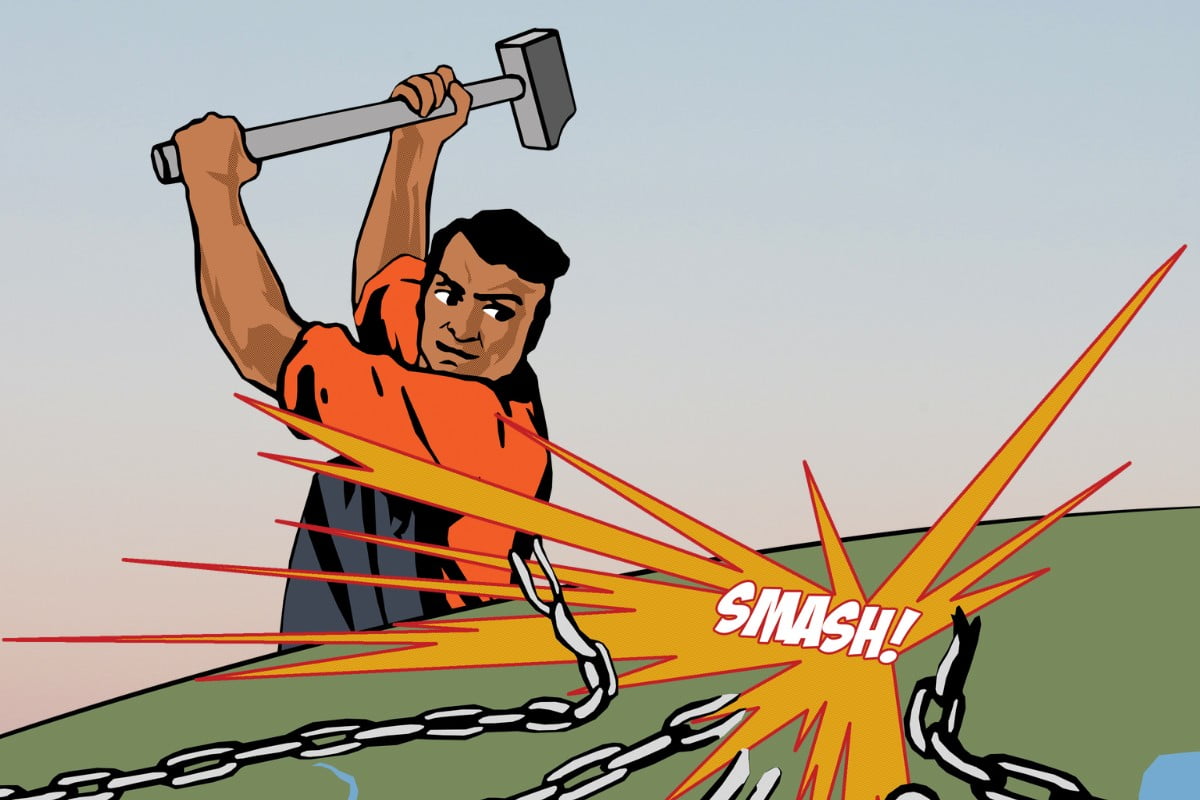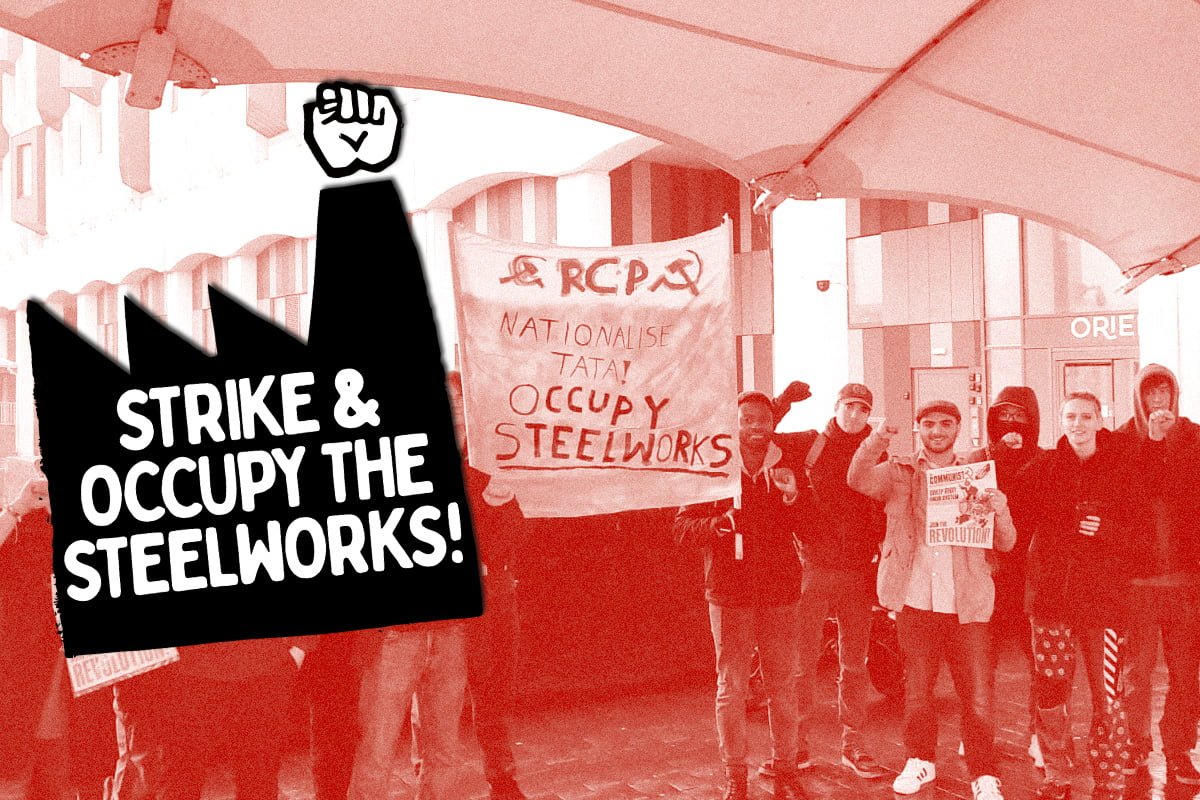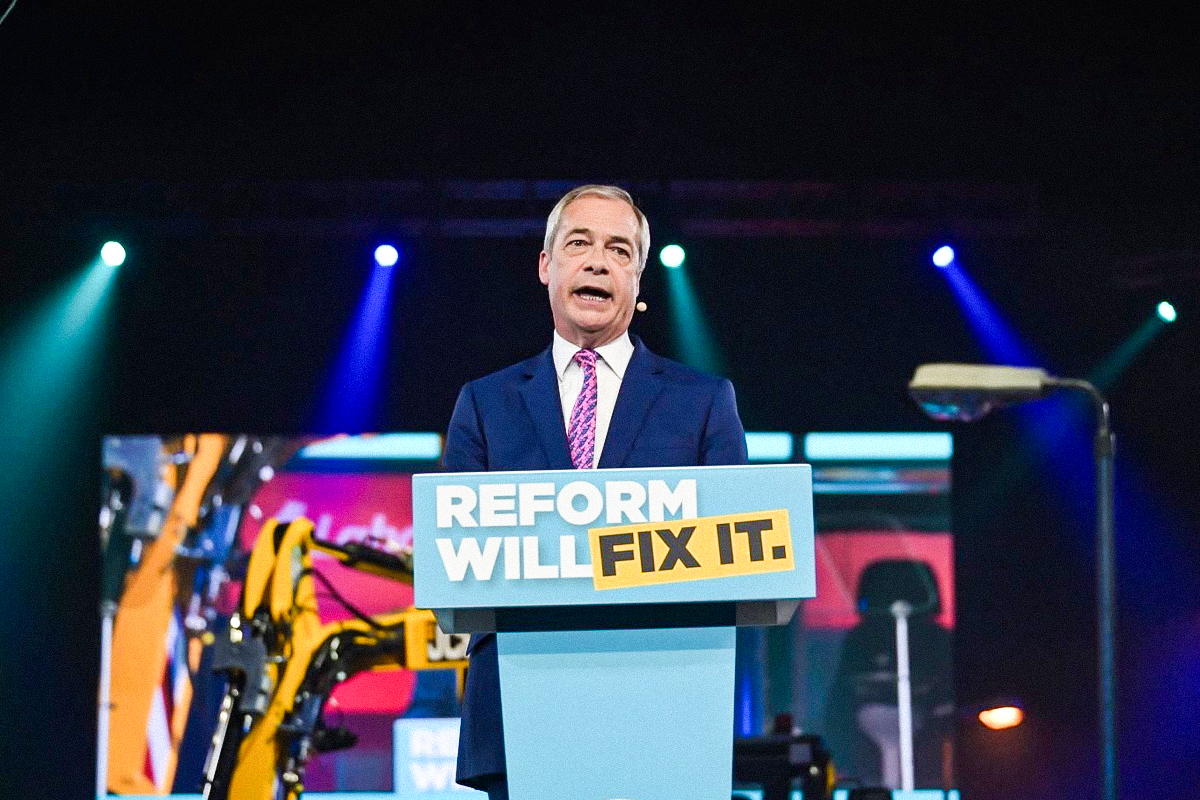In recent weeks, IMT comrades have been out talking to local people in Port Talbot about the looming job losses and what this means for them.
We started off by leafleting and postering in the town, where we made sure to cover every inch of spare space with our posters. We also had lots of really good conversations, especially at one Unite the Union meeting of steelworker activists.
The desire to do something was palpable at this meeting. Lots of ideas were passed around reflecting this: from protests outside of the Senedd and Westminster, in order to show the politicians that Port Talbot won’t go down without a fight; to blocking the motorways like the farmers in France.
We heard similar messages on the doorstep. It was also clear, however, that because nobody has made a serious move to fight back so far, there is a clear sense of frustration with the trade unions and politicians.
This culminated in our town meeting. Though this wasn’t as large as we would have liked, it was a fruitful event. It really helped many people voice their opinions, and to get a clearer perspective on the plans for a fightback.
We have raised the call for an occupation, and for a real struggle to save the town.
Fighting for something as big as a factory occupation is no small thing. It requires a lot from workers, and those we’ve spoken to in the town know that. That’s why we are going to forge ahead, in order to support the workers in their struggle.
The current demoralisation clearly hides an undercurrent of anger. Workers here are looking for something to rally behind: a mass movement or a series of strikes. And once the town sees real action, it will be hard for the bosses to stop it!
Every day on the street is a new lesson for us. We’ve learned a lot in the past few weeks. We know there is a fighting mood in the town, as we learned from our door-knocking and Unite’s meeting.
At the moment, the people who are angriest feel isolated. But when that changes, we know this town can, to quote an extremely militant steel worker who stopped to chat to us, “give Tata a haymaker!”
To that we say: the gloves are off! Let’s give ‘em ten, a hundred, a thousand fists in the air. The bosses want us to feel isolated and helpless. The communists are here to show them that we are not.
Ver esta publicación en Instagram
Who can save Port Talbot?
Liam Wiltshire, Cardiff Communists
As well as the current 2,800 jobs on the line, Tata has been axing jobs non-stop since the first 900 layoffs in 2012, leaving the Port Talbot community hanging out to dry.
Starmer’s Labour can’t see past the end of its own nose. They’ve promised £3 billion in investment across the whole steel industry. But how can we trust a word this two-faced opportunist says?
The parties in the Senedd (Welsh parliament) have only offered platitudes. Adam Price, the former leader of Plaid Cymru, said that Senedd members “must appeal to Tata’s conscience (!) to give us more time”. What conscience?!
The Welsh TUC – which should be leading a mass campaign against these closures – is merely calling for more government subsidies. This amounts to ordinary people footing the bill to keep the steelworks open, while Tata’s shareholders rake in billions. What a joke!
Unite is now balloting for strike action, which is a step in the right direction. But for many workers, this no doubt feels like too little, too late. What’s more, Unite officials have meekly appealed to the Tata bosses to hold out for a Labour government. This offers no solution.
No matter which direction workers turn, all they can see is a can being kicked down a long, alienating road. It’s astonishing to see the audacity of these ‘leaders’. They say they’re doing all they can to save jobs – yeah, their own jobs!
These cowering, capitulating ‘leaders’ spit in the face of a proud, militant, working-class tradition in Wales. Look no further than the Merthyr and Newport uprisings to see the real fighting spirit of the Welsh working class.
The only people who can save Port Talbot are the workers, organised and mobilised. We must bring the class struggle right to Tata’s doorstep. The ball’s in our court: let’s trust in our own strength and see this fight through!
Ver esta publicación en Instagram
Why is the industry in crisis?
Alice Nicholson, Cardiff Communists
Elsewhere, British Steel has announced the further closure of furnaces in Teesside and Scunthorpe. They are keenly watching to see what Tata can get away with in Port Talbot. If the jobs are lost without a fight here, then the British Steel bosses will soon follow suit.
British capitalism is crashing and burning. In its heyday, it was the manufacturing powerhouse of the world. Now, in its senile decay, it has become a desperate second-rate economy, dwarfed by its rivals.

For decades now, the capitalists have been unwilling to invest in production as they once did. They don’t want to part with the massive sums of money needed to modernise Britain’s industry and keep it from falling behind its international competitors.
British bosses have essentially abandoned manufacturing, allowing it to slip even further behind.
Instead, these parasites prefer to gamble on the financial markets. Why bother with all the risk, uncertainty, and long-term planning required for producing real goods, when you can ‘get rich quick’ through stock market speculation?
This has set Britain up for an even more precarious future. The import-dependent economy is especially vulnerable to global crises and shocks. And what little industry there is left has been carved up by foreign multinationals, who provide the majority of the investment in manufacturing.
This decline has reached every part of the economy.
The potential clearly exists for coordinated action across the steel industry and beyond. Workers in Port Talbot should link up with steel workers in Scunthorpe and Teesside to wage a collective fight against the bosses.
Ver esta publicación en Instagram
What about the environment?
Jonathan Lees, Swansea Communists
From the start, Tata bosses have cynically used the climate crisis to justify their jobs massacre. They claim that the blast furnaces must be replaced with less-powerful electric arc furnaces (EAFs) to reduce the UK’s carbon emissions.
Such greenwashing is rich coming from the bosses, who are the ones actually responsible for wrecking the environment.
While Tata tries to shut down blast furnaces in Port Talbot, they are building new ones in India. And the fact that Britain will now have to import all of its virgin steel will increase emissions further.
Plus, EAFs are only greener if the electricity used to run them is renewable. And given the Tories’ and Labour’s complete neglect of green investment policies, this won’t be the case any time soon!
Communists recognise the need to decarbonise the economy. But we can’t trust this job to the bosses, who are only interested in lining their pockets.
Only workers’ control of industry can ensure a green transition, without throwing workers under the bus.
On the basis of socialist planning, we could prioritise investment and research into cleaner ways of powering blast furnaces, and invest in renewable energy to power EAFs – all without threatening workers’ livelihoods. We wouldn’t need to choose between saving jobs and saving the planet!
Ver esta publicación en Instagram
Is occupation possible?
Karl Lonsdale, Cardiff Communists
There are many examples that show that workers are more than capable of running their own workplaces without bosses – and more efficiently too!
One example was the occupation of the Flaskô plastics factory in Brazil, in which members of the IMT played a leading role. Just like the Tata steelworks, the bosses were running the factory into the ground, and failing to reinvest in machinery.
So, in 2003, workers took things into their own hands and occupied the factory. Overnight, production was reorganised to improve working conditions, increase productivity, and reduce waste.
Within five years they reduced their working week from 44 to 30 hours, and simultaneously increased wages – all whilst maintaining productivity levels.
The running of the factory was democratically coordinated through an elected factory council, which met once a week to discuss financial, administrative, and operational matters.
This occupation acted as a beacon. The impoverished local community joined forces with the workers, occupied an empty adjacent plot of land, and began building new homes.
The workers also linked up with other occupied factories across Brazil and South America, and waged a campaign to have them nationalised.
Shamefully, the reformist Lula government rejected these demands. The factory was forced to close in 2018 when electricity was cut off, due to the debts racked up under the previous managers.
We can’t get rid of capitalism one workplace at a time. But the Flaskô occupation shows that such bold actions can point the way forward for the rest of the working class. If the Tata steelworks were occupied today, imagine the example it would set!
Ver esta publicación en Instagram
Lessons from the Upper Clyde Shipbuilders occupation
Shaun Morris, Glasgow Communists
July 1971 saw the beginning of one of the most infamous industrial struggles of the ‘70s, as thousands of shipbuilders in Glasgow seized control of their yards and began a “work-in”: an occupation in which the workers themselves ran the site, completing the orders that Upper Clyde Shipbuilders (UCS) already had.
UCS had been formed by the Labour government a few years prior to consolidate the shipbuilding industry and ensure its future. Despite the workforce being cut by 35% and productivity growing by 85%, by 1971 the new Tory government had decided to sell-off and shut-down the yards.
The most profitable yard, Yarrow – owned by the Scottish Tory party treasurer – had already been ring-fenced from the rest of UCS, while the Tories plotted to kill off thousands of jobs in the other ‘lame duck’ yards. When UCS requested state support to cover a temporary gap in finances, the Tories took the opportunity to demand that 6000 of the 8500 workers be made redundant.
With unemployment in Glasgow already high, workers could not accept this. Immediately the shop stewards’ committee declared a fightback, calling mass meetings in the yards and appealing for support.
Rather than go on strike, however, the committee decided the workers should prove the viability of UCS by continuing work and refusing access to the company liquidators.

A hundred thousand striking workers marched through Glasgow in solidarity with the UCS struggle. Over £250,000 was raised in support of the workers and their families. Sympathy poured in from across the British labour movement and the world.
In the years that followed, inspired by UCS, hundreds of other factories were occupied by workers as a method of fighting back against closures and redundancies.
Eventually the Tories relented, fearing the struggle could spread to the whole shipbuilding industry, or beyond. In Glasgow, workers were linking the fight for UCS to the struggle to oust the Tory government.
Had this been given a direction from the workers’ leaders, the explosions of industrial unrest throughout Britain in the 1970s could have brought down the edifice of British capitalism. Thatcher would never have come to power.
UCS was given a temporary stay of execution by the Tories, and then again under Labour after 1974. Ultimately, after being supported for decades by state investment and workers’ accepting huge cuts to pay and conditions, the Upper Clyde shipyards fell into the hands of BAE Systems.
What was once the pride of Glasgow is now a small factory producing the means for imperialism to murder poor people in Yemen and elsewhere.






